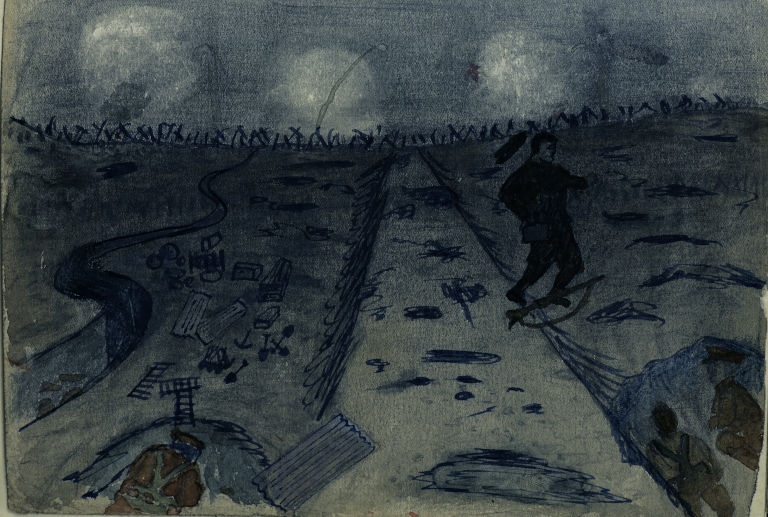The following extract abridged from Albert Clayton’s recently discovered WW1 memoir Long Before Daybreak highlights the constant hazards and hardships of trench battle.
The attack developed not, as it happened, directly against us, but against our 9th Battalion who held a trench to the right and somewhat in advance of ours. A sudden call had come for bombs and yet more bombs to be passed up to them, while all along their sector a straight wall of flame appeared. The “Boche” were trying liquid fire.
Immediately the rapid passing of those bombs became a vital factor, and Sergt.-Major Saunders the man who saw to it.
During the night a connecting trench had been dug from our old front line to the new, but there had not been time to dig it more than three feet deep. Along this shallow ditch the bombs had to be carried in sacks, each man shambling along in a stooping position to avoid the spray of bullets the “Boche” were directing over it.
Saunders knew his part to the letter and took his cue with suitable dramatic emphasis. Squatting down on a heap of gravel at the trench junction, his tilted ‘tin’ hat just below the whistling bullets, he directed the passing of the bombs with his waving revolver.
Flourishing the revolver threateningly, he announced in his light tenor voice that he would “Shoot any b….r that stopped passing.”

Nobody stopped. Though all were exhausted almost to the point of collapse, the urgency of the occasion kept the sacks of bombs on the move. Mechanically I accepted sack after sack passed on to me, in a dream carried them a few yards along the trench, and in a mist of exhaustion passed them to the next man and returned for more. My feet clung to the earth with weariness as if held down by the pull of a quick-sand. I was not built for such heavy labour and in consequence suffered agonies of fatigue where the professional navvy would just perspire a little and curse. And of such dull, insensible toil does war mainly consist.
The liquid fire attack was successfully repulsed, we were left in heavily shelled occupation, and new lines, I supposed, were drawn on the maps at Headquarters and published in the newspapers for my apprehensive family to read at home. I learnt later that we had captured the Windmill of Pozières, though at the time I didn’t know the place for Pozières and saw not the vestige of a windmill.
Three or four days more we remained there, gradually getting dirtier and dirtier, water being too precious to use for washing. We had to fetch it in petrol tins from that isolated water-cart away back on the much-shelled road in Ovillers.
Once, the fellow who had gone to fetch it failed to turn up, so I was sent after him with two more petrol tins, down the long, winding, broken trench to Ovillers. As I climbed out on to the road, there in front of me stood the solitary water-cart. There also, slumped down in the dust, lay the missing watercarrier, both he and his petrol tins riddled with shrapnel holes.
Hastily, with ears cocked for the whine of the next shell, I filled my two tins, lingered a moment longer to fill my own water-bottle, and returned with relief to the comparative safety of the trench.
Long Before Daybreak by Albert Clayton is published in paperback and eBook on Amazon.
Further information at www.longbeforedaybreak.com
Further extracts from the book will be published on our BLOG in the coming weeks.
